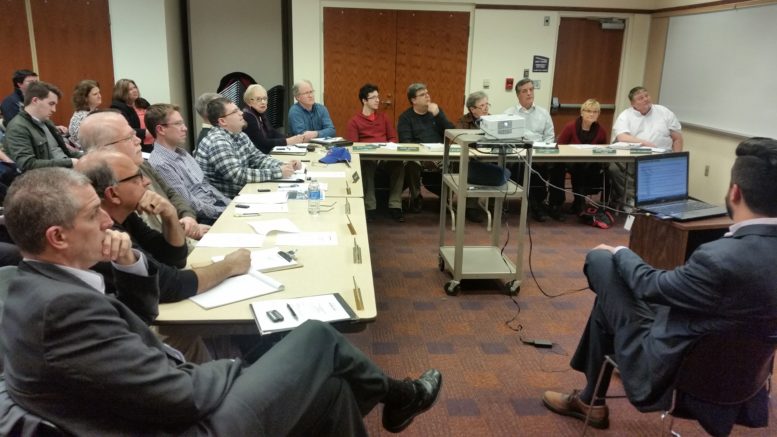By JAN LARSON McLAUGHLIN
BG Independent News
Bowling Green’s zoning rules may need more than just a tune-up. They may need a complete overhaul.
Les Pollock, of Camiros consulting firm, said ideally zoning rules are tools that help a community be what it wants to be. But in Bowling Green, the current zoning ordinance lacks consistency, is outdated, suffers from lack of enforcement, and is too “loosey goosey,” he said.
Pollock, who is working on the Community Action Plan for the city, presented his assessment Tuesday evening during a joint meeting of city council and the city planning commission.
Many of the existing buildings in the city don’t reflect the zoning currently in place, Pollock said. “I think you’ve got some pretty major repairs here.”
So the question is – does the city want a complete makeover of its zoning rules?
“Is there interest in making the zoning ordinance a real tool?” Pollock asked.
The council and planning commission members answered by using clickers to rank the importance of a series of questions. Most felt that updating the zoning was important.
Pollock warned that zoning could only do so much. “Understand, it’s not the panacea.” It can control the type of buildings, the size, signage, landscaping and parking. But it has no control over quality and behavior.
He also warned that revising zoning is time consuming, and usually results in more regulations and the need for more enforcement.
“There’s a lot of community agony that comes out of this,” Pollock said, explaining the city really needs design and development standards. “Once you do that, you’ve pretty much opened up a whole can of worms.”
After the meeting, Bowling Green Planning Director Heather Sayler said the overhaul seems overwhelming. But she welcomes the challenge.
“We’ve wanted to tackle this for a long time,” she said. “Having experts like this is very helpful.”
But ultimately, it will be up to city council and the planning commission, she said. “We’ll see where our council and planning commission is willing to go.”
It won’t be easy, Pollock said.
Zoning rules often crash head-on with political realities and community traditions.
“For most people, zoning isn’t about the big picture. It’s about what happens on their land or next to them,” Pollock said.
And while city council and planning commission members do their best for the community, most have no training in community planning.
“The reality is, it’s the butcher, the baker, the candlestick maker,” who are forced to make the decisions.
That’s where Pollock comes in. It’s his job to push when city officials aren’t sure which direction to take. Though the zoning ordinance needs an overhaul, Pollock warned that the city should not scrap the current rules and start from scratch. The existing rules are there for a reason, and should be built upon. The rules were created for Bowling Green. It won’t work to take Perrysburg’s zoning rules and try to use them here.
“You’ve got to understand what’s treasured and what’s open for change,” he said.
“Community character is probably one of the most important things you have,” Pollock said.
One place to start is by tightening up definitions of items such as building types, lot configurations and signage.
“Having clear definitions is important,” Pollock said. Lack of clarity leads to arguments. “And sometimes arguments become lawsuits. This is a legal document and definitions are important.”
Simplifying the ordinance doesn’t always help – but clarity does. “You are crafting zoning districts to carry out what you want to happen,” he said.
The city’s approval procedures are lacking for variances, rezoning, conditional uses, plan reviews and non-conforming uses. The current rules allow some of these special considerations due to “hardships.” But Pollock said most city’s make sure it’s not due to hardships created by the landowners themselves.
“Feelings don’t work well in courts. Standards work well in courts,” he said.
Then there’s the sticky issue of enforcement.
“We know enforcement is an issue” already in the community, Pollock said. That problem will only get bigger when there are more rules. “We will have all these rules – somebody’s got to enforce them.”
That may mean establishing permit fees to help pay for personnel to enforce, he said.
Bowling Green faces issues that are common to many college towns – single family homes being converted into apartments or multi-family homes, and homes with historical character that some are trying to preserve.
Parking standards are also an issue, with the city’s current rules reflective of 1960s-1970s standards, Pollock said. The trend is for less paved over parking areas, especially on the fringes of college campuses. Younger people are becoming less reliant on having their own cars, so less parking space is needed in communities, he said.

